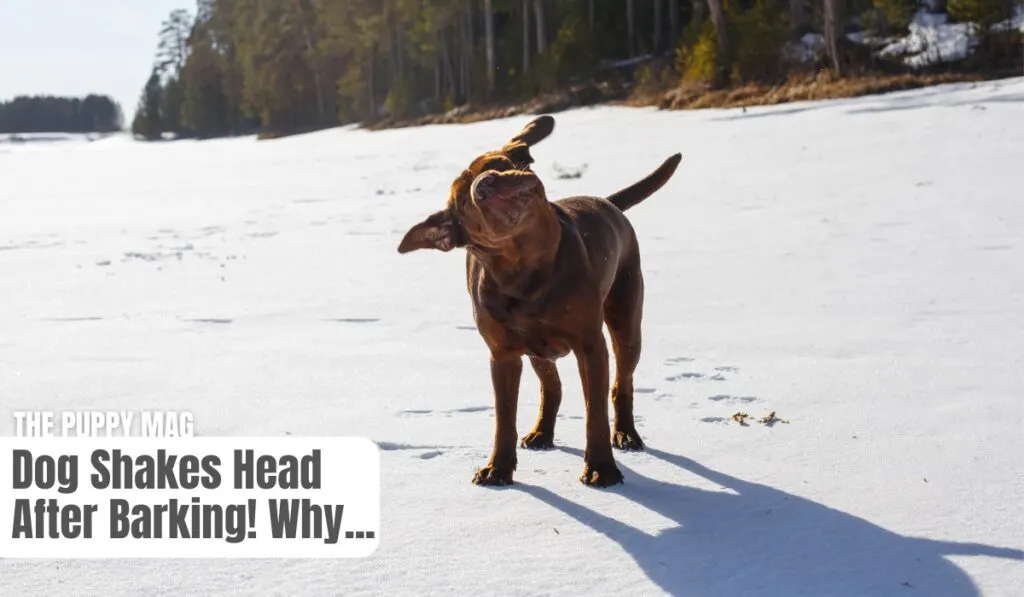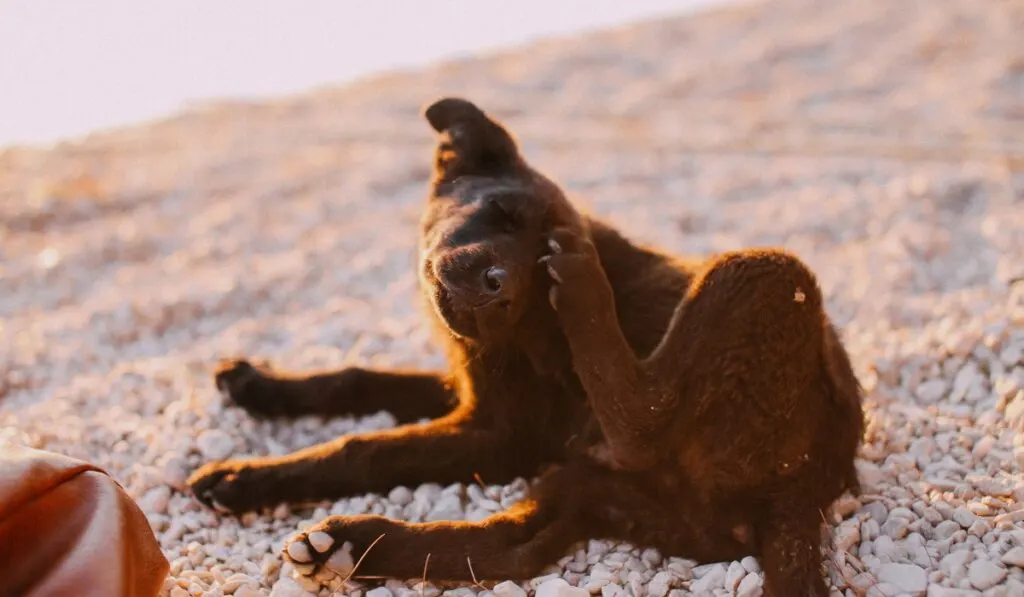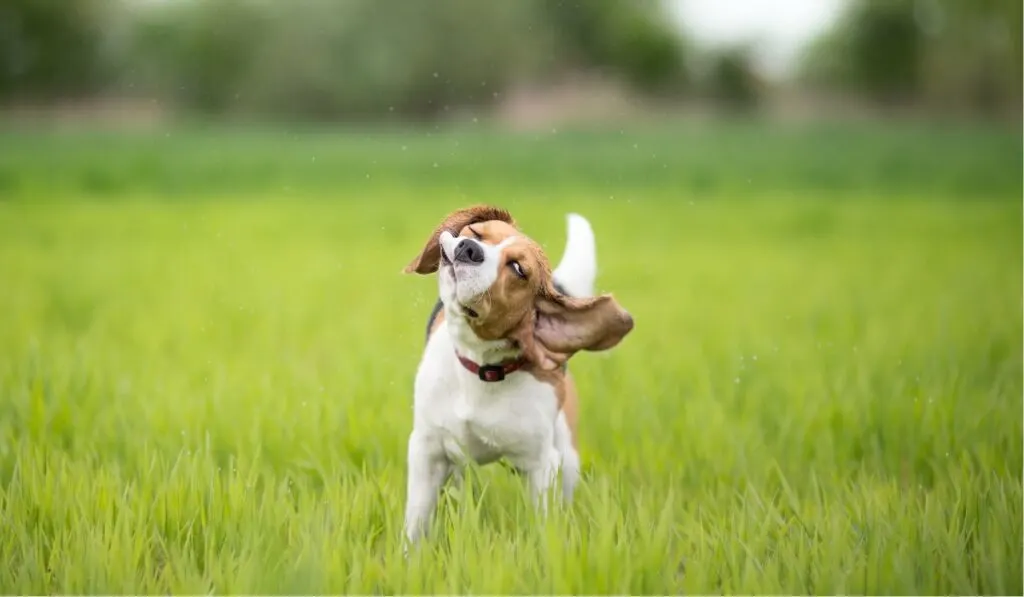It’s a common sight for dog owners: your pup finishes up a good old barking session, and then they start shaking their head, almost like they’re trying to shake off the sound.
Why do they do it? Should you be worried?
This article will dive into the reasons behind your dog’s head-shaking habit and whether it’s a cause for concern.
So, grab a cup of tea, make yourself comfortable, and let’s delve into the world of strange dog behaviors.

7 Reasons Why Your Dog Shakes Their Head After Barking
The seven reasons listed below are by far the most common causes are the likely culprits for this behavior.
Identifying which of these applies to your dog will involve some detective work, and mainly taking things into context. We’ll explain this a little more below.
1. Physical Response to Loud Noise ⭐
Barking can be loud, especially for a dog’s sensitive ears. Your pup might be shaking their head to clear their ears or because they find the sound uncomfortable. Even if they are the ones to do the barking!
2. Discomfort or Itchiness ⭐
Head shaking could be a sign of an itch or discomfort. The barking could loosen debris or irritants in the ears, leading to the shaking.
3. Ear Infections ⭐
Frequent head shaking, especially after barking, can be a sign of an ear infection. This is particularly common, so we’ll explain more about this issue below. If this is the case for your dog, you’ll notice other symptoms too.
4. Presence of Ear Mites or Ticks ⭐
Ear mites and ticks are tiny parasites that can make a home in your dog’s ears, causing great discomfort and irritation. These pesky critters can cause an infestation that leads to intense itching, inflammation, and sometimes even infection. Ear mites are particularly common in puppies but can affect dogs of all ages.
5. Expressing Emotion ⭐
Some dogs shake their heads as a way of expressing their feelings or releasing stress. It could be linked to handling stress and anxiety too. As we’ll explain just below, what could start as an anxious reaction can soon become an autonomous habit.
6. Behavioral Habit ⭐
Some dogs develop habits or routines in response to certain stimuli. Your dog may have just developed a habit of shaking its head after barking. OCD can happen in dogs very easily if they keep repeating the same behavior multiple times per day.
7. Foreign Body or Water ⭐
Occasionally, a dog might get a foreign body like a seed, grass, or small pebble in its ear, causing discomfort. This is also the case for water. If your dog has just jumped out from a pool, lake or the ocean, and accidentally got water in their ears, you’ll notice them shaking their head for quite some time after.

Should I Worry About This Behavior?
Occasional head shaking after barking is usually nothing to worry about, as it’s often just a response to the loud noise or a way to express emotion.
Still, owners should look to solve this issue, otherwise it could lead to a habit that’s hard to rectify.
When it’s a sign of something worse would be if the head shaking is very intense, doesn’t stop for a long time, your dog seems in discomfort, or they keep repeating the behavior several times throughout the day.
Knowing whether it’s serious or not comes down to context. Is it a one off? does it have a reasonably logical explanation? or there obviously something not right with your dog?
Common Dog Ear Infections
Ear infections in dogs are quite common, especially in breeds with floppy ears.
These infections can occur when yeast or bacteria grow in the warm, moist environment of the ear canal.
Symptoms include redness, swelling, unusual ear discharge, and yes, head shaking. In fact, head shaking is a very common symptom and is why we’ve dedicated some sections about ear infections.
Symptoms of Ear Infections
Apart from head shaking, there are other signs of ear infections you should look out for:
- Scratching or pawing at the ear
- Whining or showing discomfort when the ear is touched
- Unpleasant odor from the ear
- Redness or swelling in the ear canal
- Discharge from the ear
More info: MSD Veterinary Manual

At What Moment Should I See a Vet
If you notice your dog frequently shaking their head, especially if it’s accompanied by any of the other symptoms mentioned above, it’s time to see a vet.
When to seek extra help:
- Excessive head shaking
- Change in eating or drinking habits
- Unusual discharge from ears, eyes, or nose
- Limping or difficulty moving
- Frequent vomiting or diarrhea
- Unexplained weight loss or gain
- Behavioral changes (e.g., aggression, sudden fearfulness)
- Any other negative symptoms
They can provide a diagnosis and appropriate treatment to ensure your furry friend’s health and comfort.
Can Dogs Hurt Their Ears From Barking
Generally, dogs don’t hurt their ears from barking.
However, intense or prolonged barking could potentially lead to some minor discomfort, which could result in the head shaking you’ve been noticing.
Additionally, if your dog keeps on shaking their head (somewhat vigorously) after barking, this could eventually cause injury or a sprain.
This could stem from another issue you might have which would be excessive barking. Many dogs, especially rescues are prone to barking behavioral issues. So that is definitely worth seeking more information about.
FAQs
My dog shakes his head but his ears are clean, what could be the issue?
It’s possible your dog has an allergy causing itchiness or discomfort. In rare cases, head shaking can also be a sign of neurological issues. It’s always best to consult a vet if you’re concerned.
How can I prevent ear infections in my dog?
Regular cleaning (with vet-approved cleaners) and check-ups can help prevent ear infections. Also, drying your dog’s ears after swimming or baths can prevent the growth of bacteria.
Can I use human ear drops for my dog?
No, never use human medications on your pets unless advised by a vet. Dogs have a different ear canal structure and certain substances safe for humans could be harmful to them.
How often should I clean my dog’s ears?
It depends on the breed and individual dog. Some need weekly cleanings, others less often. Your vet can provide the best advice.
Can a dog shake his head too much?
Yes. Excessive head shaking can lead to a condition called an “aural hematoma” where blood vessels in the ear flap burst, causing swelling.
Last thoughts
In conclusion, while occasional head shaking is normal for dogs, especially after a barking spree, it’s important to keep an eye out for signs of distress or discomfort.
Regular ear checks and cleanings, coupled with vet check-ups, can ensure your four-legged friend stays healthy and happy. Happy barking (and head shaking)!
